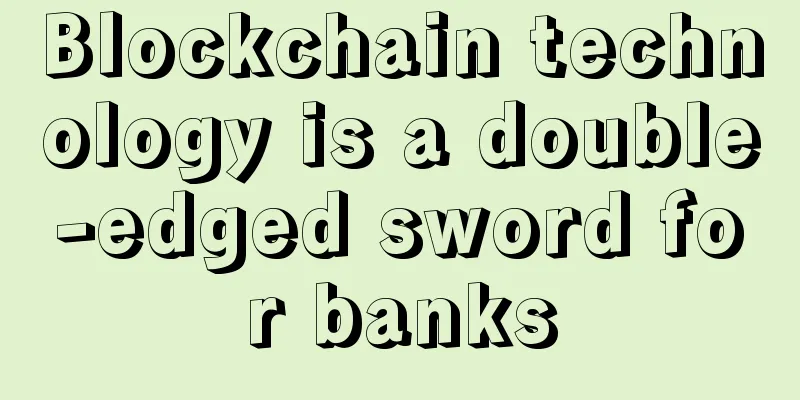Blockchain technology is a double-edged sword for banks

Translation: Annie_Xu The much-hyped blockchain technology may initially hit the earnings of international investment banks, but its potential to reduce costs across financial markets could boost dwindling profits. A new bank survey estimates that blockchain could cut costs in global currency markets by $15 billion to $20 billion. Morgan Stanley and other global investment banks are also affected by so-called post-trade settlement, which involves custody of assets and verification of transactions, ensuring that corporate loans are in place, and is expected to be the first to be affected by blockchain in the next five years. Many international investment banks act as custodians for the entire securities trading process and receive corresponding service fees; they also use the time gaps in large transaction settlements to make investments and profits. The Australian Stock Exchange and others also make profits by providing clearing and settlement services, but now they say that up to $470 billion in clearing revenue is at risk, so they are exploring using blockchain to replace the existing settlement system. Net loss Huw van Steenis Huw van Steenis, Managing Director at Morgan Stanley in London, said:
Until now, banks have been able to take advantage of delays in trade settlements to use clients’ funds for short-term trading or investments. But large international banks also see the potential for blockchain to reduce system and human costs in transaction verification; and to make up for profits lost due to regulators' interest rate hikes since the financial crisis. All large banks, including Australia's four major banks, are at the forefront of blockchain technology exploration because being the first to gain the benefits of technology can make business models more in line with market conditions. The current blockchain explorations mainly include the R3 Blockchain Alliance and the Linux Foundation's Hyperledger project.
More convenient settlement The report also pointed out that the instant settlement achieved by blockchain will become the main reason for banks' loss of income. Although the technology can already achieve instant settlement, regulators, system upgrade costs, and whether instant settlement can reduce liquidity have all become obstacles to the implementation of the technology.
One reason is that instant settlement eliminates the possibility of short selling, which can increase liquidity. The next to be affected are likely to be trade finance, international currency exchange and international banking; international banks transfer funds by establishing debit and credit accounts for the same customers between different countries, hence the name “correspondent banking”. Ripple, an American blockchain company, is working with banks in countries such as Australia to develop a distributed ledger that would free banks and even hedge funds from reliance on correspondent banks. |
<<: European Parliament member: I suggest everyone buy some Bitcoin before commenting
>>: How can the Ethereum blockchain help finance HIV treatment?
Recommend
Facial features of a very narcissistic person
There are always many very narcissistic people ar...
What exactly happened between JuBi.com, Shark Coin, and Mr. Huang?
Event Review On September 22, Yangcheng Evening N...
How many buckets are best for doing business?
Nowadays, more and more people choose to start th...
Authoritative interpretation: The development path of sovereign blockchain - Analysis of the white paper series "Guiyang Blockchain Development and Application" (I)
Editor's note: On December 31, 2016, the Guiy...
Jeff Garzik plans to create a 21 Bitcoin computer-powered crowdsourcing labor market
There is a problem of understanding the 21 Bitcoi...
Russia’s Central Securities Depository Tests Blockchain Asset Trading
Rage Comment : The Central Securities Depository ...
Favorite face to visit friends
Nowadays, if feelings are not strong and two peop...
The 7nm mining machine you have been looking forward to will be on sale at 14:00 today!
Ladies and folks! Big monkey! We are pleased to a...
What kind of face likes to study traditional culture
Today is a diverse world with many cultures. The ...
Analyzing a woman's character and destiny from her facial expression
1. A woman with a red face If a woman's face ...
Are people with small nostrils stingy?
There are often people with small nostrils around...
Detailed explanation of the annual fortune-telling method for people with eight warehouses and two warehouses
Age group: 15 to 24 years old. Good luck position...
What are cryptocurrency wallets, public keys, and private keys?
Author | Cuo Pi Produced by | Vernacular Blockcha...
What will happen if there is a mole in the philtrum? Analysis of moles in men and women!
Moles in different positions have different meani...
The fate of having a small tooth between the front teeth
There is some correlation between teeth and a per...
![[100 Questions and Answers about Filecoin in Pictures] Question 59: What is multi-signature?](/upload/images/67e68442a0e67.webp)








